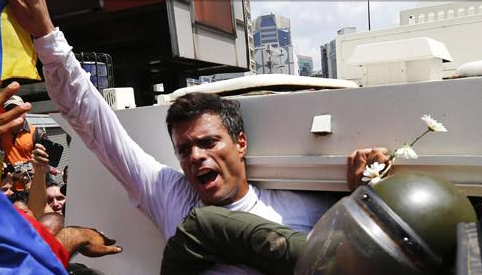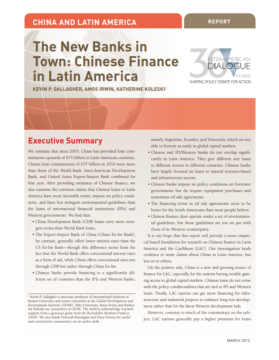Hugo Stay Home
Hugo Chavez, the Venezuelan president, has clearly been enticed by the Libyan drama, where his longtime friend and ally, Muammar al-Qaddafi, is under siege from rebel forces.
This post is also available in: Español
For anyone following Venezuela’s increasing authoritarianism — and the unending tragedy that has visited that country — Judge Susan Barreiro’s sentencing Leopoldo López to nearly 14 years in prison on September 11 was hardly surprising.
True, some expected the decision to be somewhat less severe, aimed at containing the public outcry, but no one seriously thought the process would meet even minimal standards of justice and due process. Some of the terms used to describe the proceeding — “sham”, “farce,” “travesty” — have been, if anything, understated.
What is happening in Venezuela is all about politics, an attempt by the government led by Nicolás Maduro to hold onto power, after over 16 years of Chavista rule. From the heightened border tensions with Colombia to the López ruling, political calculations are driving decisions to avoid defeat in the parliamentary elections scheduled for December 6th. According to Datanálisis and other respected polls, the government has good reason to worry.
Not surprisingly, given the gravity of the still deepening economic crisis — the world’s highest inflation rate, shortages of basic goods, and an economy projected to shrink by 7 percent this year—the Maduro government is immensely unpopular. The desire for change is understandable. The opposition, despite internal differences, has an unprecedented opportunity to gain control of the national assembly.
The regime is betting that the possible political benefits of the outrageous López sentencing will outweigh the costs. The benefits include distracting attention from economic woes, unifying hard core Chavistas, deepening divisions within the opposition and instilling fear and discouraging turnout for the elections. Potential costs are converting López into a martyr and ratcheting up international criticism of the regime.
Maduro is not Pinochet, and 2015 is not 1975, but it is hard to deny that López (and an estimated 78 others) are political prisoners, and their situations should be a matter of regional concern. The role of UNASUR, essentially siding with the Maduro government, has been especially shameful.
So far, however, the Maduro government has faced little if any pressure from the region’s governments on the question of political prisoners. While a number of former presidents have, to their credit, been outspoken on the issue, current heads of state have stayed largely silent. Most maintain that Venezuela’s political conflict needs to be worked out internally. True, Maduro is not Pinochet, and 2015 is not 1975, but it is hard to deny that López (and an estimated 78 others) are political prisoners, and their situations should be a matter of regional concern. The role of UNASUR, essentially siding with the Maduro government, has been especially shameful.
The situation in Venezuela is highly uncertain. A number of different scenarios are possible. The most optimistic one — that elections will bring about a healthier balance of political forces that will be eventually lead to serious dialogue and negotiations in the bitterly polarized nation — seems remote.
Pessimistic scenarios — including collapse, chaos and spreading violence — may not be most likely, but should not be ruled out. In that case, Venezuela’s South American neighbors will have little choice but to deal with the spillover consequences of what is already the hemisphere’s most profound crisis.
A decent and brave leader committed to improving his country through democratic means, López epitomizes Venezuela’s poignant human drama. He and his family are paying a huge cost for trying to change a government whose description of him as a “terrorist” insults every thinking person’s intelligence.
López is a symbol of that crisis. A decent and brave leader committed to improving his country through democratic means, he also epitomizes Venezuela’s poignant human drama. He and his family are paying a huge cost for trying to change a government whose description of him as a “terrorist” insults every thinking person’s intelligence.
Hugo Chavez, the Venezuelan president, has clearly been enticed by the Libyan drama, where his longtime friend and ally, Muammar al-Qaddafi, is under siege from rebel forces.
Estimates of the volume, composition, and characteristics of Chinese lending to the region since 2005.
Is the Venezuelan government likely to comply with the IACHR’s ruling or will it uphold the ban?

